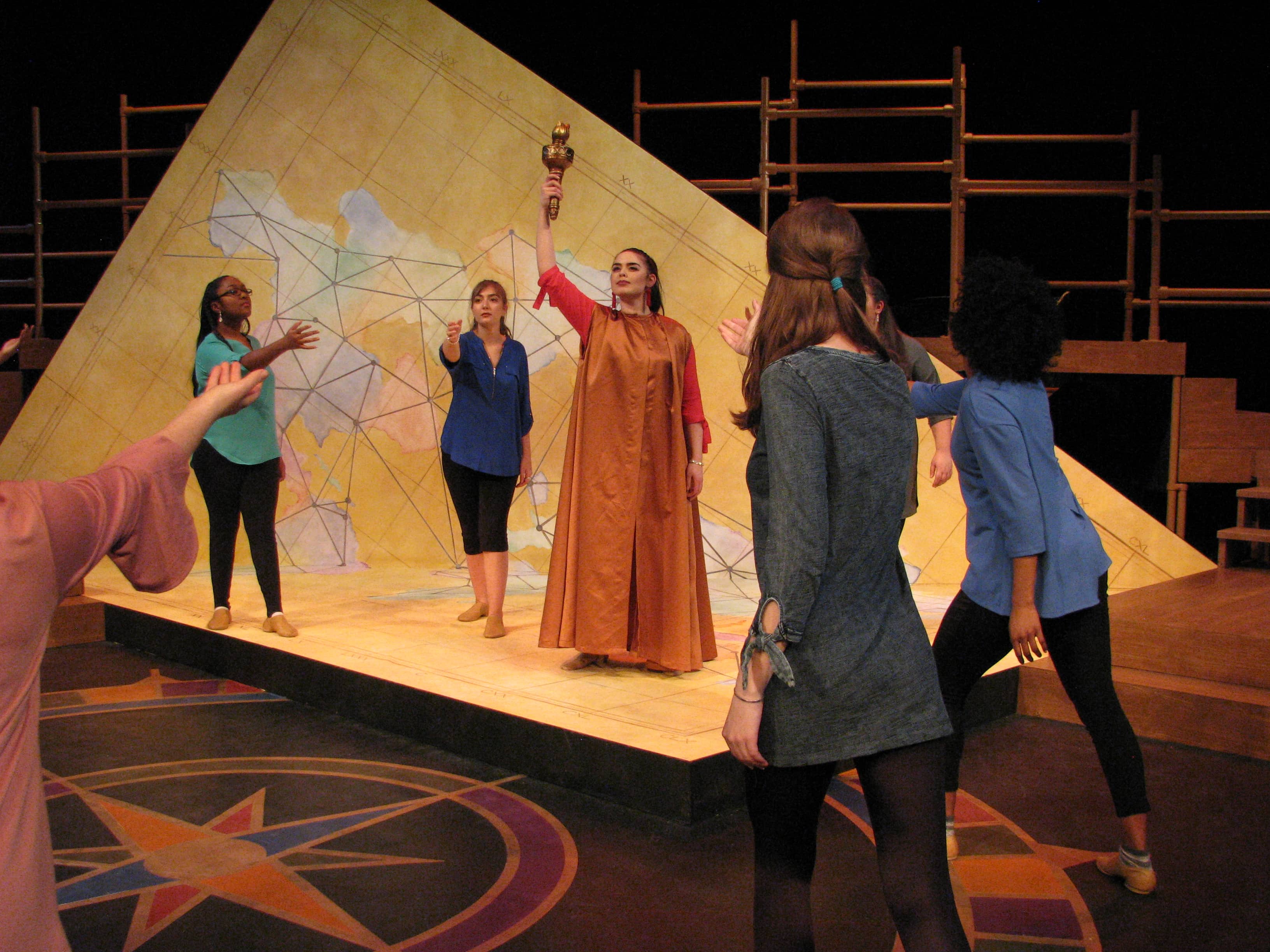The inspiration for Migratory Tales comes from multiple sources, according to the play’s creator and director, Leslie Jacobson. Our current and painfully divisive debate on immigration was foremost for Jacobson, Professor of Theatre at The George Washington University and a long-time champion of people marginalized by the dominant culture. Her own students at GWU’s Corcoran School of the Arts & Design represent a rainbow of cultural origins. They were a natural fit for a play that explores who exactly Americans are, and how we arrived here.

Yet Jacobson’s thoughts on immigration might not have coalesced until she witnessed thousands of snow geese arrive on the Eastern Shore, a stop on their annual migration from north to south. Migration, she realized, is a natural force. It is part of the DNA of many living things, humans included. According to the United Nations High Commissioner for Refugees, over 65 million people are on the move throughout the world at present. Many are seeking to escape political oppression, others are being forced by climate change, and some are motivated by the hope of improving their lives. Demonizing immigrants denies this basic force in human life.
Like America, Migratory Tales itself is a mélange. It combines fictional portrayals of migration with the cast’s own experiences either as immigrants themselves or as the descendants of immigrants whose stories endure. It is punctuated by some well-known songs, including Irving Berlin’s rendition of Emma Lazarus’ “Give Me Your Tired, Your Poor,” and traditional spirituals including “Let My People Go” and “Sometimes I Feel Like a Motherless Child.” Other songs were written especially for this show by Jacobson and Roy Barber, with arrangements by Barber and Philip Carluzzo. “Snow Geese” underscores the nature of migration while “Life Will Always Find A Way” and “Will I Ever See You Again” address the pain of separation and the resilience of those who have migrated.
The musical numbers were performed sweetly by the all-female cast, who also adroitly represented the many cultures that comprise the American mosaic. They include Africans who came as enslaved people, or later because of the political upheavals that plagued their own countries. In one of the most memorable lines of the evening, an African-American cast member tells us that she is “from Wakanda and from Things Fall Apart,” — references to the mythical Afro-futuristic homeland of the Black Panther and Chinua Achebe’s 1958 novel chronicling the disintegration of traditional Nigerian society in the wake of European colonialism. Another descendant reminds us of the Americans who were already here when European migrations began. She tells us with bitter irony about fearing that she would be drained of her Indian identity by the repeated blood tests necessary to verify her native ancestry. A third reminds us that immigrants sometimes turned on one another. Her French Canadian ancestor was drummed out of the family after his marriage to a woman of Irish origins.
Pancharee Sangkeo’s striking set design is a vivid display of our global community. A giant compass covers the floor. From it rises a jarring, asymmetrical world map that suggests a planet folding in on itself. Costume Designer Sigríđur Jóhannesdóttir clothes her actors in simple garb, then transforms them effectively with textiles representing their native lands. Bright African prints, well-worn wool shawls, and delicate Chinese silks emerge from duffels and valises during the performance, transporting each character back into past generations.
Despite its affecting moments and noble intentions, however, Migratory Tales breaks little new ground. It addresses familiar questions: Is America a melting pot or a salad bowl? How do we become one people while maintaining and honoring the cultures from which we came? How do we welcome and embrace each other? The stories themselves, while replete with brave, searing moments, become redundant, lessening the impact of the whole performance. One wishes that with such incredible raw material, this theatrical piece would build towards greater dramatic tension, leaving us with some higher truths and new insights into the human proclivity to move. In these days of rage against immigration, we can all use a timely and bold reminder of own origin tales.
Running Time: One hour and 40 minutes, with no intermission.
Migratory Tales plays through April 1, 2018, at the Dorothy Betts Marvin Theater – 800 21st St. NW in Washington, DC. For tickets, call 202-994-0995 or purchase them online.




